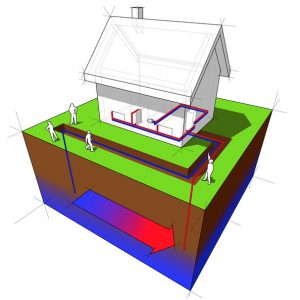 When most people think of the word geothermal, they think of using the heat of the earth to provide warmth. This makes sense because the word thermal is right there in the name. And geothermal heat pumps are indeed an excellent way to bring warmth into a home.
When most people think of the word geothermal, they think of using the heat of the earth to provide warmth. This makes sense because the word thermal is right there in the name. And geothermal heat pumps are indeed an excellent way to bring warmth into a home.
But geothermal heat pumps, like all heat pumps, offer cooling as well. If you are currently thinking about making a change in your home’s air conditioning as part of planning for the coming summer, we advise you give some thought to going with a geothermal heat pump installation in Bluffton, IN. It may sound like a daunting task, but when you rely on our experienced professionals, you’ll receive the best results. We were one of the first geothermal contractors for Northeastern Indiana and we remain on the cutting edge of the best in geothermal technology.
How Geothermal Heat Pumps Provide Cooling
The indoor components of a geothermal heat pump (also known as a ground-source heat pump) are similar to those of a standard (air-source heat pump): a refrigerant coil where refrigerant is either condensed or evaporated, and a blower fan to send the heated/cooled air into the ventilation system. But where an air-source heat pump uses an outdoor coil to perform heat exchange, a geothermal heat pump uses loops buried in the ground.
These loops are placed around 6 to 10 feet down in the earth, which gives them access to a more stable temperature. When the heat pump is in cooling mode, the refrigerant absorbs heat indoors, then transfers that heat into a water/anti-freeze mixture moving through the loops. (We also carry geothermal systems that send the refrigerant directly into the loops. These are called Direct Geoexchange systems.) The heat is then deposited into the ground, using it as a heat sink. This removal of heat from the house creates cooling. In heating mode, the process reverses and heat is brought from the earth into the house.
The Benefits of Geothermal Cooling
Now that you know how a geothermal heat pump cools down a home, you’ll want to know what the advantages are. After all, installing the ground loops is a big job and costs more than a conventional air-source heat pump. Is it worth it?
In many cases, the answer is yes. What sets ground-source heat pumps apart from other types of heat pumps, as well as air conditioners and furnaces, is their energy efficiency and reliability. According to the U.S. Department of Energy, a geothermal heat pump works at 3 to 6 times greater energy efficiency than an air source model. You can expect the installation to quickly pay you back in energy savings. The relatively stable temperature of the earth means the heat pump also has an ample source for heating and cooling—make the system more dependable. Plus, geothermal systems are beneficial to the environment.
If you have further questions, speak to our geothermal specialists today. They can help you make a choice about geothermal energy and then schedule service.
Collier’s Heating & Air Conditioning: Over 30 years, a company you’ve grown to trust.
